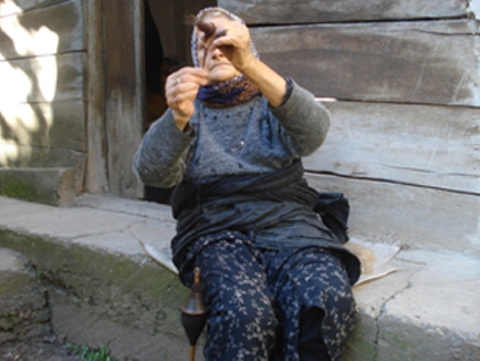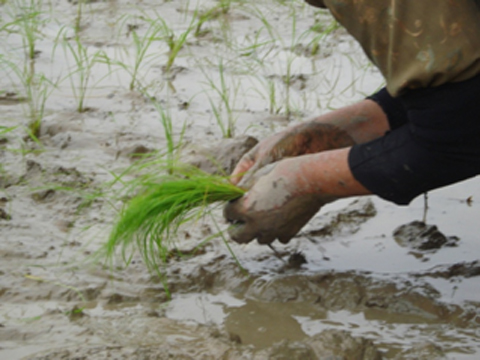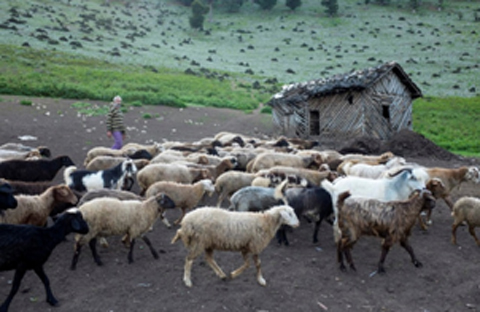
It is funny how things we pass by everyday in our surrounding environment without our due attention can be of great interest to the discerning visitor.
Here are the options:
The local tea factory is a short walk away from us. Its owner, Mr Manuchehr Daryani, is a true tea connoisseur and speaks enough English to share his passion. It still functions during the harvest season which runs from April until September, although it is possible to visit all year round as staff report to work for packaging, sales and general maintenance. Inside you will find a fascinating collection of British-made machineries from decades back, made in the industrial glory days of Sheffield and Liverpool. There are also copies Made in India and others locally produced and added in later years. The factory is itself over 70 years old and was installed when there was still no electricity in the village, so a German-made diesel operated AEG power generator ran the factory until it was sadly sold.
I once asked the chief engineer how they would have transported the heavy generator all the way from the nearest pier on the Caspian Sea, some 15 kilometres away, with no roads available. If you want to hear it I am happy to tell you, when you visit!

Interestingly for me, a few years ago, in the factory office, I found old letters with stamps carrying the figure of the late Shah of Persia addressed to my grandfather’s textile shop in Tonekabon (also known as Shahsavar). When I asked further, I found out that because in those days there was no postal services in the village, anyone from the village living in another part of the country, be it on a visit or doing their national service, would send letters to my grandfather who used to cycle to visit “his” tea plantation every day and hence take the letters with him…
The local black smith still makes axes, scythes, shovel, scissors and other instruments as they did millennia ago.
He is a charming character who has many stories to tell.

The local rice processing factory owned and run by Mr. Kaveh (Nazeriyan), an old friend of my grandfathers. The factory is open from the end of the summer until early spring, depending on the harvest. He is very knowledgeable about the traditional way of processing the crop in the old days.
The local fish market in Tonekabon is open all year round, but from October until late March, when fish is in season, it is a bustling market with all sorts of fish from the Caspian Sea and some farmed fish also, fishmongers buy on an auction basis.
The local pottery workshop, some half an hour’s walk or a 10 minute drive from Khoonegeli is something from the very past. European travellers talk about at least half a century before pottery was made this way on this scale in Europe. Churners, furnaces, pots and pans amongst other objects made out of clay…
A charming family of three generations live and work together in absolute harmony, just like the old days, using the most basic tools like foot operated wheels.

Ramsar Palace Museum was where the first Pahlavi King Reza Shan had his holiday residence in this famous resort. Long gone are the bars, the discotheques and charter flights but the palace, a modest white marbled villa with European ornaments and fine Persian carpets, stands to tell the tales. It is well worth a visit before a dip in the private bath of the late Shah now open to the public.
Day trip to Masuleh, Ghale Roodkhan and Guilan Rural heritage Museum.
Heading West from Khoonegeli, a two-hour drive towards the province of Guilan will bring us to the small city of Fooman, with its famous walnut and cardamom cookies. This is where the road bifurcates into the Hyrcanian forest gaining altitude. Ghale Roodkhan is a spectacular red bricked fortress deep in the forest and getting there involves a hike of about an hour and to the right the road leads to the famous village of Masuleh.
Masuleh is a UNESCO site which has become very popular with Iranian holiday makers; but the little known secret to you, the discerning traveller, will be “the pride” of Guilan aka Guilan Rural Heritage Museum, the work of Dr Taleghani and his team including local authorities and universities in bringing together old houses from all corners of this beautiful province in an area outside Sangar.
To visit all three as a day trip will be rather tiring so you may wish to spend the night in Masuleh and return to Khoonegeli the next day.
Anzali Lagoon, itself a Ramsar site, can be added if you opt for the latter.
Water-skiing in the Caspian
Yes you read it right! It is a popular sport in our neck of the wood and you may well enjoy a ride in the calm and warm waters of the southern Caspian Sea if you visit between May and October.
Motor boat, skis, life jacket and instructor are all provided.
Cooking lessons in Northern Iranian cuisine.
Ask any Iranian about good gastronomy in Iran and they will tell you shomal meaning the north. Northern Iran is blessed with the most varied seasonal plates in the country if not the world over.
Why not go to the local market with our cook, shop and come and see her cook? It promises to be an unforgettable experience.
Seasonal activities
During the rice planting and harvesting seasons you may see how rice is planted, still by hand, one by one, and how it is harvested, again by hand, using sickle. Women tend to plant and men tend to harvest.

Traditional sheep and cow farming is close by in the village during the autumn and winter months when you would expect snow in the pastures. In the summer the semi-nomadic shepherds take their herds onto high mountains and that is where we shall see them when we go hiking.

Live music
You may savour the best of Persian spiritual rhythms by one of the masters of percussion in Iran, Hamed Sorayya, if he is not in India.

Absolute Isolation in winter
We are proud to offer you the possibility of getting away from it all. A simple hut with a wooden stove for cooking and heating in a remote mountain village, deep in snow from December until late February where you may spend as many days as you wish all on your own or with the people of your choice. There are no roads, little or no phone signal and no other human being. If lucky, you may see wildlife such as brown bears, wolves, cheetahs. You will be supplied with food and you will cook for yourself. The only thing we need to know is when to come and walk you back to civilization. The hiking is about 5-7 hours depending on the amount of snow.

Last but not least
Simply be, breathe deeply and stretch from time to time in our purpose built yoga and meditation hall, if you need to. Khoonegeli is a good place for just being, in harmony with the surrounding ambiance. Contemplate life, your trip, be it to come or gone already…
Enjoy Iran!
